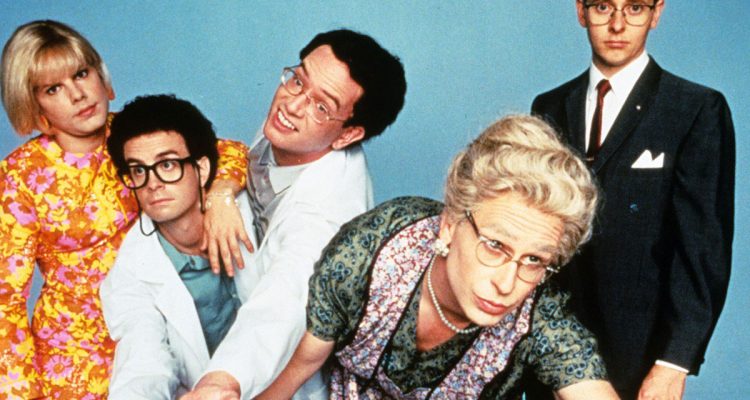You don’t have to be a fan of the legendary Canadian comedy group The Kids in the Hall to appreciate a thorough and loving new documentary about them, Reg Harkema’s “The Kids in the Hall: Comedy Punks.” Knowing their work might help make sense of the wonders of “I’m crushing your head” or Chicken Lady or countless other characters, many of them with wigs. But this two-part documentary, now playing on Prime Video, is the kind of successful and sprightly look into a cult sensation that welcomes all. It goes through the history of these five Canadian men and the sketch comedy group that brought them together and culminated in a revered TV series that became legendary.
“The Kids in the Hall: Comedy Punks” harnesses a decades-spanning, sometimes very rocky, but often very funny love story between five funny Canadian men who wanted to realize the strange jokes and real pain in their heads. Sketch comedy became their catharsis and life source, gaining popularity by doing shows at Toronto’s Rivoli club, creating a following that led to a Lorne Michaels-produced TV pilot, which became a five-season series. The members of the group—Dave Foley, Bruce McCulloch, Kevin McDonald, Mark McKinney, and Scott Thompson—are interviewed together in the present tense, sitting in the Rivoli club, reflecting on their journey, speaking openly about when they all got along, and when they didn’t.
READ MORE: ‘Kids In The Hall’ Trailer: The Canadian Kings Of Comedy Are Back May 13 On Prime Video
Adding even more authenticity to the nostalgia of the proceedings are the talking heads, who give a scope of just how influential and successful they are. Mike Myers appears in the documentary as a type of super-fan, who once performed with them in their earlier days, and expresses a type of personal pain after seeing what they had accomplished with their TV pilot. One wonders if that has inspired his own ambition and dedication to comedy, which we have seen with variously mixed results. Other comedians who geek out about the Kids in the Hall include Eddie Izzard, Jay Baruchel, Mae Martin, Reggie Watts, and Fred Armisen. It becomes clear through who speaks in this documentary the influence and expanse of the Kids’ work.
One of the best elements of the documentary is how it owns the subtitle of “Comedy Punks”: by discussing the unusual road the group took to fame, the dark and discomforting ideas that they wanted to joke about (like their alcoholic fathers), and the open and loving queerness of their characters. The documentary fills in the sense of how radical they were and continue to be. The group wasn’t just perfectly timed for Gen X malaise, becoming gods of the dorm room TV. They also gained importance as comedians not afraid to challenge their viewers, and not only through their in-your-face humor and strange punchlines.
“The Kids in the Hall: Comedy Punks” has a lot in common with music documentaries that go through different albums and creative moments, piece by piece, making you a fan of their artistic growth in the process. (The most recent standout to do this was Edgar Wright’s “The Sparks Brothers”). Here, it’s about touching on each season of “The Kids in the Hall” show, and getting into how they got more visually intense as the show went on. With their solo but cross-cut interviews, sometimes responding to what others said elsewhere, it’s funny to see the group talk openly about artistic decisions they didn’t agree on. Bruce thought he made a great piece of work with his broody, Andrei Tarkovsky-inspired “Sausages,” even though it doesn’t go for laughs—almost everyone else hated it.
And like the recent Sparks documentary, “The Kids in the Hall: Comedy Punks” boasts a strong rhythm that only trips up more when it’s about modern times. With part one being particularly efficient, part two gets noticeably lighter and a little more rushed. There are notes about the fans who bonded online over the troupe’s work, writing different references to each other, and the doc touches on this more to sell the comedy as a loving community than to provide any greater insight into it. It’s a noticeably different feel than the higher stakes of the earlier passages, but it helps fill in the overall story.
The Kids in the Hall are going through a revitalization thanks to Amazon at the moment—there’s also a whole new season on Prime Video, timed to this documentary. (They talk about it in this documentary as not being a “reboot,” but another season.) Watching “Comedy Punks,” one feels even more grateful that the Kids are back doing comedy on their own terms. “Comedy Punks” shows how hard-fought their creative spirit has always been. Watching this loving documentary can only provide hope for the next creative punks who see their story and its shining light, and get the message. [B+]

